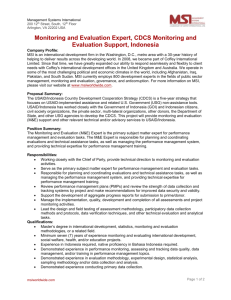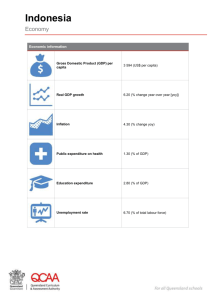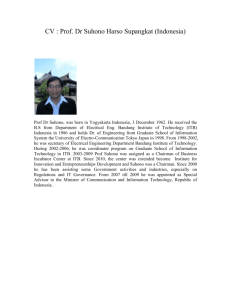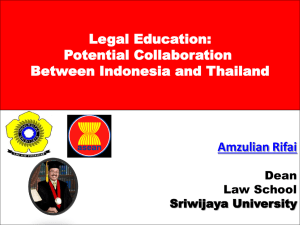Indonesia Consultative Group Meeting
advertisement
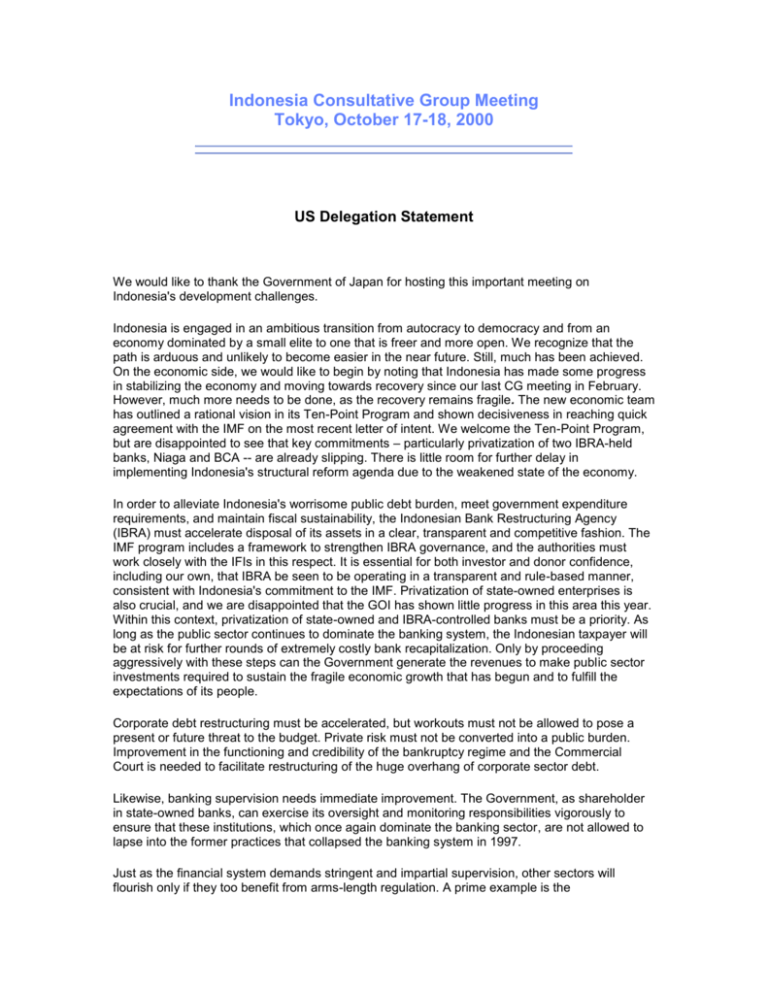
Indonesia Consultative Group Meeting Tokyo, October 17-18, 2000 US Delegation Statement We would like to thank the Government of Japan for hosting this important meeting on Indonesia's development challenges. Indonesia is engaged in an ambitious transition from autocracy to democracy and from an economy dominated by a small elite to one that is freer and more open. We recognize that the path is arduous and unlikely to become easier in the near future. Still, much has been achieved. On the economic side, we would like to begin by noting that Indonesia has made some progress in stabilizing the economy and moving towards recovery since our last CG meeting in February. However, much more needs to be done, as the recovery remains fragile. The new economic team has outlined a rational vision in its Ten-Point Program and shown decisiveness in reaching quick agreement with the IMF on the most recent letter of intent. We welcome the Ten-Point Program, but are disappointed to see that key commitments – particularly privatization of two IBRA-held banks, Niaga and BCA -- are already slipping. There is little room for further delay in implementing Indonesia's structural reform agenda due to the weakened state of the economy. In order to alleviate Indonesia's worrisome public debt burden, meet government expenditure requirements, and maintain fiscal sustainability, the Indonesian Bank Restructuring Agency (IBRA) must accelerate disposal of its assets in a clear, transparent and competitive fashion. The IMF program includes a framework to strengthen IBRA governance, and the authorities must work closely with the IFIs in this respect. It is essential for both investor and donor confidence, including our own, that IBRA be seen to be operating in a transparent and rule-based manner, consistent with Indonesia's commitment to the IMF. Privatization of state-owned enterprises is also crucial, and we are disappointed that the GOI has shown little progress in this area this year. Within this context, privatization of state-owned and IBRA-controlled banks must be a priority. As long as the public sector continues to dominate the banking system, the Indonesian taxpayer will be at risk for further rounds of extremely costly bank recapitalization. Only by proceeding aggressively with these steps can the Government generate the revenues to make public sector investments required to sustain the fragile economic growth that has begun and to fulfill the expectations of its people. Corporate debt restructuring must be accelerated, but workouts must not be allowed to pose a present or future threat to the budget. Private risk must not be converted into a public burden. Improvement in the functioning and credibility of the bankruptcy regime and the Commercial Court is needed to facilitate restructuring of the huge overhang of corporate sector debt. Likewise, banking supervision needs immediate improvement. The Government, as shareholder in state-owned banks, can exercise its oversight and monitoring responsibilities vigorously to ensure that these institutions, which once again dominate the banking sector, are not allowed to lapse into the former practices that collapsed the banking system in 1997. Just as the financial system demands stringent and impartial supervision, other sectors will flourish only if they too benefit from arms-length regulation. A prime example is the telecommunications sector where vast new investment is required—investment that the private sector is prepared to make when regulatory conditions provide the security necessary to protect their capital and technology. On the political side, we strongly support the efforts being made by many Indonesians to build a democratic society, and recognize that President Wahid continues to be a proponent of democratic and pluralistic principles. We applaud recent successes in effecting progress with the transition to democracy, including the development of an increasingly free and vigorous media and the emergence of the Indonesian parliament as an active forum for debate on national issues. Indonesia is facing many political challenges which will directly impact Indonesia's economic recovery. The Government's decentralization program, which begins next year, holds the potential of increasing government accountability and bringing decision-making much closer to the people most affected. We look to the government to promote decentralization by linking transfers of revenue to transfers of responsibility for expenditure, and by discouraging new barriers to trade between regions. Given the political and economic risks associated with decentralization, we encourage the GOI to continue efforts to involve civil society organizations and universities in planning and the implementation of decentralization. Cessation of conflict in restive regions is another major challenge, as continued violence and instability is creating a sense of unease within the population, inhibiting both domestic and foreign investment, and retarding economic recovery. The situation in West Timor is a good example of this, where armed militia groups have terrorized both locals and East Timorese refugees, attacked international aid workers, and carried out cross-border raids which led to the death of two UN peacekeepers. The brutal murder of 3 UNHCR aid workers on September 6 sent shock waves through the international community and led to the passage by acclamation of UNSCR 1319, which calls for the militia to be disarmed and disbanded immediately and for those responsible for this act against the international community to be held accountable for their crimes. We recognize and welcome the steps the GOI has taken towards compliance with UNSCR 1319, including the seizure of many weapons and the arrest of suspects. But we simultaneously recognize that there is still much to be done; many weapons remain in the hands of militias and criminal elements – thereby rendering West Timor unsafe for the return of international aid workers – key perpetrators of violence remain at large; and the GOI has yet to unveil its long awaited comprehensive plan for the resettlement and repatriation of refugees. We have come here today to pledge continued and in fact expanded assistance to the government of Indonesia. But in doing so, we must state clearly that our pledge is based on the assumption that Indonesia will fulfill its responsibilities to the international community, including continued and full compliance with UNSCR 1319, and that our willingness to proceed with obligations under our pledge will take into account Indonesia's progress toward these goals. We look to performance as of November 13th, the date of the visit of the UN team, as a key benchmark. Beyond Timor, ongoing violence and unrest in a number of Indonesian provinces including Aceh, Papua and Maluku continue to be a source of concern to international investors and the international community writ large. The historic "Joint Understanding for Humanitarian Pause for Aceh" – a bold effort by the government of Indonesia and the leaders of the Free Aceh Movement to achieve peace within a unified Indonesia– is fragile and in danger of unraveling. We call upon both the government of Indonesia and the people of Aceh, including the Free Aceh rebels, to redouble their commitment to the humanitarian pause and to reject violence and pursue a political path to peace. In Papua, too, we call for increased dialogue between the government and disaffected groups to prevent further escalation of violence. A lasting peace in both regions – so important for Indonesia's continued economic recovery – can only be achieved through negotiated settlement. Our concerns about security relate to a broader issue raised in the last Consultative Group meeting— that of justice sector reform. Justice sector reform is important not just to redress grievances, improve human rights and end violence in Atambua, Aceh, Ambon, Jayapura and Jakarta, but to boost small business development and foreign investment, too. Increased foreign investment remains critical to Indonesia's ability to grow its economy and improve the conditions of its citizens, especially those living in poverty. We urge the Government of Indonesia to take immediate action to create an environment of economic stability and political predictability that will be welcoming to foreign as well as increased domestic investment. As we said in February, citizens have a fundamental need to know that their rights to free speech, assembly, a fair trial, security of property and person will be protected by the law and institutions supporting it. Investors need to be able to trust their partners to honor contractual agreements, and to have access to fair adjudication if differences arise, including respect for the use of and the decisions from international dispute resolution mechanisms. Since last February, seventeen new Supreme Court Justices have been appointed, but selection of a Chief Justice is still pending. The Joint Investigative Team into Judicial Corruption has been set up, but a single judge has yet to be disqualified. Like other good commissions with good governance mandates, the Joint Investigative Team still requires funding and adequate staff. Incidents of street justice are increasing as Indonesian citizens become further disenchanted with the inability of the police and judicial system to provide justice. Governance reform is key to making democracy work. We hope to see results from the World Bank/UNDP partnership for governance and plan to be active participants through our programs and regular consultations. The partnership's concentration on judicial reform, electoral systems and management, civil society strengthening, corporate governance, and civil service reform is on target. We support fully efforts at this meeting and in side-meetings focusing on reform in the forestry sector. Increased deforestation through illegal logging and conversion is emblematic of the importance of natural resources management to Indonesia's efforts to improve governance, provide justice, and ensure citizen access to the political process. Concerning specific implementation of the U.S. government's assistance to Indonesia, one tangible action the Indonesian Government could take to facilitate our work would be to lift restrictions placed on travel by diplomats and foreign assistance agency representatives and workers to areas of critical need such as Maluku, Aceh, Papua and West Timor. Such restrictions inhibit our ability to assess needs and develop responsive programs with Indonesian counterparts. We are particularly concerned about the increased questioning and even harassment by security and intelligence agencies to which those implementing our programs have been subjected. In conclusion, the U.S. Government is committed to providing strong support to Indonesia in its efforts to work on these challenges, to make the transition to democracy, rebuild a thriving economy, provide internal security and maintain its territorial integrity. We have demonstrated this commitment over the past year by increasing our assistance almost 50 percent above what we originally pledged at the February 2000 meeting of this Consultative Group. We have made the case with our Congress and within the U.S. Government community that the United States should aggressively support Indonesia's humanitarian needs and its transition to a free-market democracy. We thus are perplexed and concerned about statements by senior Indonesian government officials accusing the international community of focusing on political issues relating to East Timor while not providing assistance to deal with the humanitarian needs of the refugees in West Timor. In fact, over the past year we have provided close to $80 million in humanitarian assistance related to Timor, nearly half of which has gone for assistance in West Timor alone. Other donors have provided similar assistance. The U.S. Government hopes to maintain and strengthen our relationship with Indonesia in order to help build the democratic institutions and sustain economic reforms that enable Indonesia to once again become a prosperous, stable, and democratic leader in South East Asia. Ultimately, however, our ability to help is dependent on Indonesia's willingness to put into practice those essential actions that move Indonesia forward, towards prosperity and stability. Indonesia must demonstrate the requisite political will and leadership necessary to defeat the forces working in opposition to reform by pushing forward with desperately needed economic reforms, pursuing negotiated solutions to separatist conflicts, overhauling the justice sector, maintaining security in the face of ethnic and sectarian violence, and holding those accountable for violence and other crimes accountable. Part and parcel of this will be further steps toward full compliance with UNSCR 1319, without which the Government of Indonesia could find support waning for its efforts. To paraphrase a well-known adage, the U.S. will trust, but it will also verify. _____________________________________________________________________________ ______________________ US Pledging Statement U.S. Government would like to thank the Japanese Ambassador Kawakami for hosting the CGI, and working to find consensus on the West Timor issue. The U.S. has two foreign policy goals that guide our assistance program to Indonesia: the institutionalization of democracy and the resumption of sustainable economic growth, built on a foundation of justice and transparent government. Unfortunately, the lack of security in a number of regions of Indonesia, and Indonesia's insufficient efforts to resolve the problems in West Timor, are limiting our ability to assist Indonesia. Our assistance consists of the following programs: Promoting democracy. USAID programs include: training national provincial and local legislators in the fundamental skills of representing constituents; drafting laws and determining budgets; working with the Attorney General on ways to attack corruption; promoting civil society groups generating new ideas, organizing and mobilizing citizens, exposing corrupt practices; helping the Indonesian media lead the way in opening the national debate on fundamental issues of good governance; supporting provinces and newly created associations of local officials as they manage the rapid decentralization of power now legislated for January 2001. State Department scholarship and visitor programs are helping Indonesians learn from U.S. experience grappling with issues of good governance. Supporting sustainable economic growth through a more transparent, sound policy and legal environment. USAID-financed advisors work are working to: improve corporate governance; strengthen the enforceability of contracts; combat monopolies; level the playing field for small and medium enterprises; streamline licensing and promote better working conditions; and improve the quality of the debate on economic policy. USAID also places special emphasis on reforming the food and energy sectors, both vital to economic growth. Improving natural resource management. USAID programs encourage parliamentarians, administrators, communities and NGOs to understand their respective responsibilities, and promote the formation of responsible, sustainable policies at the central, provincial and local level, including community-based management of natural resources. Social safety net. USAID has helped maintain critical health, HIV/AIDS, and family planning programs at a time of extreme GOI budgetary stress during the continued period of economic rebuilding. USAID also has humanitarian assistance and crisis mitigation activities focused on West Timor, Aceh, Papua, and the Moluccas, when circumstances permit. The U.S. Department of Agriculture (USDA) food programs help stabilize food prices and generate funding for NGO hwnanitarian programs. The U.S. Naval Medical Research Unit (NAMRU) is continuing its longstanding research into the diseases that plague Indonesians. For U.S. fiscal year 2001, $130 million in grant assistance has been requested from the U.S. Congress to support the U.S. Government program in Indonesia implemented by USAID and the Departments of Justice, Treasury and State. In addition, Indonesia is likely to be a major beneficiary of regional funds for which specific country allocations are made later in our budgetary process. Exchange and cultural affairs programs from the Department of State (Public Affairs Scholarships) will continue at their current half- million dollar level. USDA expects to have commodity programs again in FY 2001, very tentatively estimated to total in the range of $110 $120 million, and a food assistance (P.L.480 Title 11) program administered by USAID in the $20 million range. The Overseas Investment Corporation (OPIC) stands ready to assist with political risk insurance, loans and loan guarantees, but only after resolution of current disputes. In sum, the actual levels and types of U.S. Government assistance to Indonesia are, as always, subject to appropriations decisions of the U.S. Congress and unanticipated competing requirements, but are expected to exceed $270 million in the aggregate in U.S. fiscal year 2001. But the U.S. decision to obligate these pledged funds will take into account not only Indonesia's economic progress on such issues as that of the Independent Power Producers, but also that on UNSCR 1319. FY 2001 Pledge Amounts of the United States Government Development Asst. funds: Economic Support Funds: OFDA: (depends on disaster requirements) $80 million $50 million USDA PL 480 Title 1: $30 million (very tentative figure) USAID PL 480 Title 11: $15 million Trade Development Agency $ 1 million Naval Medical Research Unit: $ 5 million Section 416: 440,000 tons recommended by USDA to be monetized to support NGO operations (value estimated to be $80 million to $90 million) Public Affairs Scholarships: $0.5 million



